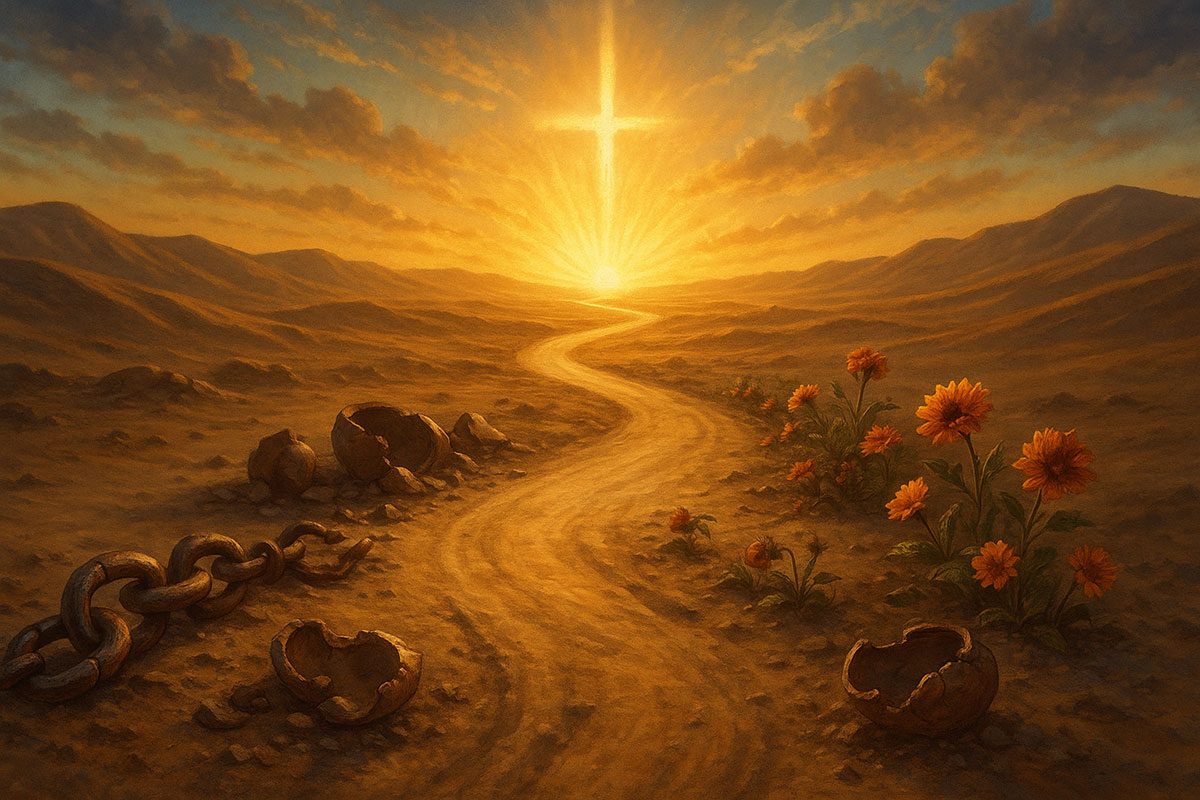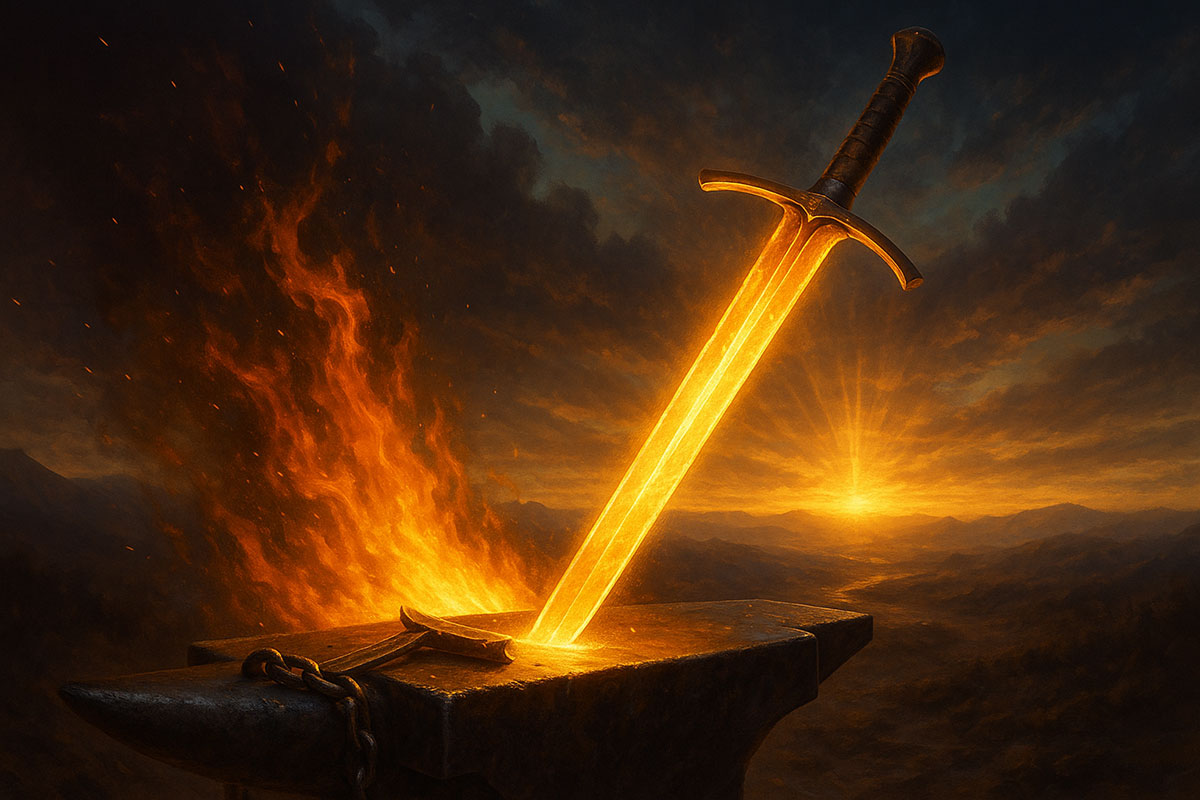
|
Getting your Trinity Audio player ready...
|

Introduction By Desmond Tutu:
My beloved brothers and sisters, we gather here not to escape life’s struggles, but to face them with honesty and hope. Each of us knows what it is to stumble, to fail, to wander in deserts of silence. And yet, the good news of the Gospel is this: our setbacks are not the end of our story.
God is the great Redeemer, the One who turns broken pieces into mosaics of grace. He allows us to fall, not to crush us, but to teach us how to rise in Him. Tonight, we will listen as faithful men and women share how the wilderness became their sanctuary, how disguises became doorways, how defeat turned into victory, and how testimony transformed pain into purpose.
Let us lean in, for these are not just their stories—they are our stories. And more importantly, they are God’s story written upon our lives.
(Note: This is an imaginary conversation, a creative exploration of an idea, and not a real speech or event)

Topic 1: When God Allows Setbacks — Why Do We Fall?

Participants: Joel Osteen, T.D. Jakes, John Piper, Christine Caine, Tony Evans
Moderator: Desmond Tutu
Opening by Desmond Tutu
“My dear friends, tonight we sit together with a theme that every one of us knows all too well: setbacks. Life does not move in straight lines. Sometimes we stumble, sometimes we are pushed, and sometimes God Himself seems to hide. But what looks like a fall, in God’s grace, may become a rising. Let us begin.”
First Crucial Question
Why does God allow setbacks, even for faithful people?
T.D. Jakes:
“Setbacks are God’s classroom. They break us open so that His anointing can pour out. David was hunted like an animal before he was crowned king. You can’t carry glory without first carrying pain. The setback proves that God is still shaping you.”
Joel Osteen:
“Sometimes the enemy means it for harm, but God flips it for good. A closed door doesn’t mean you failed—it means God is redirecting you to something greater. Joseph didn’t stay in the pit, and neither will you. Your setback is the setup for your promotion.”
Christine Caine:
“I’ve faced betrayal, burnout, even cancer. And I’ve seen this: God wastes nothing. Those setbacks drew me closer to Him than any success ever could. They stripped away self-reliance and taught me to lean into His presence, even when the pain screamed louder than hope.”
Tony Evans:
“God allows setbacks because His goal is not comfort but character. He is building holiness, not just happiness. Sometimes He lets what we build fall apart so He can rebuild it in His Kingdom design. A setback is often a divine demolition before reconstruction.”
John Piper:
“We must not forget sovereignty. Nothing happens outside of God’s wise plan. Setbacks force us to loosen our grip on this world. As Paul wrote, ‘This light, momentary affliction is preparing for us an eternal weight of glory.’ The purpose is eternal, not temporary.”
Second Crucial Question
How should we respond when we’re in the middle of a setback and don’t see the purpose yet?
Christine Caine:
“Be honest with God. Lament if you must, but keep showing up. Keep doing the next faithful thing. It’s obedience in the dark that builds intimacy with God. Don’t despise the small acts of faith that carry you forward.”
John Piper:
“We must cling to God’s worth above His gifts. In the storm, we declare: ‘Though He slay me, yet will I trust Him.’ Setbacks test whether we treasure Christ Himself, or only what He gives.”
Joel Osteen:
“Keep speaking victory, even when you feel defeated. Say, ‘I may be down, but I’m not staying down.’ Your words shape your faith, and your faith shapes your future. God hasn’t forgotten you, and your best days are still ahead.”
T.D. Jakes:
“Sometimes faith is just standing still. Don’t rush to fix what only God can heal. You don’t need the full picture to trust the Painter. Let Him fight the battle while you hold your peace.”
Tony Evans:
“Stay tethered to Scripture and community. Isolation magnifies despair. In the waiting, ask: ‘Lord, what are You teaching me?’ That turns suffering into school. It transforms delay into discipleship.”
Third Crucial Question
When the comeback finally comes, how do we make sure we don’t just celebrate the victory but also carry the lessons of the setback?
Joel Osteen:
“Remember where God brought you from. Share your testimony, not just your success. People are inspired by the comeback, but they’re transformed when they see the struggle behind it.”
T.D. Jakes:
“Don’t waste your pain. Oil comes from crushing. If you forget the crushing, you’ll think the oil was free. The palace means nothing if you can’t remember the cave.”
Tony Evans:
“The lesson sticks when you use your comeback for God’s glory, not your own. Align the victory with His Kingdom purpose. If your comeback only benefits you, you’ve missed the point.”
Christine Caine:
“I carry my lessons by lifting others. My comeback becomes their encouragement. When what you’ve learned helps someone else, the lesson has become legacy.”
John Piper:
“Fix your eyes on the resurrection. Every smaller comeback points to that final victory in Christ. Carrying the lesson means remembering that your story is not ultimate—His story is.”
Closing by Desmond Tutu
“My friends, what wisdom we have heard! A setback is not the end; it is a bending of the path toward something higher. In our tears, God is near. In our caves, God is shaping kings and queens. In our crosses, He is preparing resurrections. May we walk from this place not fearing the falls, but trusting the One who lifts us up.”
Topic 2: The Wilderness Season — Hidden but Not Forgotten

Participants: Mark Batterson, Rick Warren, Priscilla Shirer, Mark Gungor, Francis Chan
Moderator: Max Lucado
Opening by Max Lucado
“Friends, sometimes God takes us to the wilderness—not because He has abandoned us, but because He wants to meet us there. The wilderness can feel like silence, waiting, hiddenness, even failure. But again and again in Scripture, God does His deepest work in the desert. Tonight, let’s explore how God shapes us in those seasons.”
First Crucial Question
Why does God often lead His people into wilderness seasons?
Rick Warren:
“The wilderness strips away distractions. When you can’t rely on applause, position, or possessions, you learn to rely on God. Remember: before ministry, Jesus spent forty days in the wilderness. Preparation always precedes purpose.”
Priscilla Shirer:
“In the wilderness, God whispers what you can’t hear in the noise. Think of Elijah—he didn’t meet God in the earthquake or fire, but in the gentle whisper. Wilderness isn’t punishment; it’s intimacy training.”
Francis Chan:
“I’ll be blunt. We need wilderness because we’re addicted to comfort. God lets us feel hunger so we’ll long for the Bread of Life. We feel thirst so we’ll drink from Living Water. If everything was easy, we’d never truly need Him.”
Mark Gungor:
“You know, I see the wilderness like a marriage! (laughs) You think you’re signing up for a honeymoon, but then comes diapers, bills, and in-laws. The wilderness exposes what’s really in your heart. And if you let it, it’ll teach you patience and laughter in the hardest days.”
Mark Batterson:
“Every prayer has a process. Sometimes the wilderness is God’s way of saying, ‘Keep circling.’ Jericho didn’t fall on day one—it fell on day seven. The wilderness is the circle of persistence where faith matures.”
Second Crucial Question
What practices sustain us when the wilderness feels endless?
Priscilla Shirer:
“The Word of God. It’s our manna. In dry seasons, you don’t always feel goosebumps in prayer, but the discipline of opening Scripture daily will feed your soul. Obedience is more important than feelings.”
Mark Batterson:
“Pray bold, circle prayers. Even if it takes years. I’ve learned that persistent prayer rewires your perspective. It doesn’t just change circumstances—it changes you.”
Mark Gungor:
“Humor helps! Seriously, laughter is medicine in the desert. You can either cry about the sand or build a sandcastle. If you can keep joy alive, even through jokes, you’ll find strength to keep going.”
Francis Chan:
“Simplify. Fast. Give away. The wilderness is not the time to clutter life with more stuff. I tell people: when it feels dry, strip back to the basics—worship, service, Scripture, prayer. Less noise, more God.”
Rick Warren:
“Stay connected to community. The worst thing you can do is isolate yourself in the wilderness. Find a small group, even one or two friends, and let them walk with you. God never intended us to survive deserts alone.”
Third Crucial Question
How do we know when the wilderness season has accomplished its purpose?
Francis Chan:
“When you stop craving the exit and start craving God Himself. The wilderness has done its work when you say, ‘If all I have is You, it’s enough.’ That’s the point.”
Rick Warren:
“You’ll see fruit. Patience, character, deeper compassion. Romans 5 says suffering produces perseverance, perseverance character, and character hope. When you come out with hope instead of bitterness, you know God has finished a lesson.”
Priscilla Shirer:
“Your heart becomes attentive. After wilderness, you hear God’s voice differently. You recognize His whispers faster because you’ve been trained in the quiet.”
Mark Batterson:
“Sometimes it’s a door that opens that you couldn’t force yourself. You’ve prayed, waited, walked faithfully—and suddenly, God makes a way. That’s when you know: the circle is complete.”
Mark Gungor:
“And sometimes, you don’t even notice until later. You look back and say, ‘Wow, I survived what I thought would kill me—and I’m stronger, funnier, and more grateful.’ The wilderness gave you resilience.”
Closing by Max Lucado
“Friends, the wilderness is not wasted. It is God’s workshop, where He chisels, shapes, and softens us for His purposes. The Israelites left Egypt but needed the desert to become a people. Jesus left the Jordan but needed the desert before His ministry. You may feel hidden now, but you are not forgotten. God is writing your story—even in the silence of the sand.”
Topic 3: Setup in Disguise — How God Works Behind the Scenes

Participants: Max Lucado, Steven Furtick, Andy Stanley, Beth Moore, Levi Lusko
Moderator: Rick Warren
Opening by Rick Warren
“Friends, sometimes what looks like disappointment is actually divine appointment. God often works backstage, arranging what we cannot see. Joseph thought he was forgotten in prison, Esther seemed hidden in a palace, and Paul was chained in Rome. Yet every apparent setback was a setup in disguise. Tonight, let’s explore how God works behind the scenes.”
First Crucial Question
Why does God often disguise His setups as disappointments or detours?
Steven Furtick:
“Because if we knew it was a setup, it wouldn’t build our faith! God hides it so we’ll learn to trust Him in the dark. Look at Elijah by the brook Cherith—hidden, fed by ravens. It looked like isolation, but God was preparing him for Mount Carmel. The disguise develops dependence.”
Max Lucado:
“I like to say: God is working while we’re waiting. He’s weaving threads we can’t see yet. Joseph didn’t know the pit was a path to the palace. The disguise keeps us humble, because if we saw the whole plan, we’d take credit for it.”
Beth Moore:
“The disguise is mercy. If God had shown me the trials and betrayals ahead of time, I would have run away. By disguising the setup, He keeps us from fear, and by the time we realize it, He’s already sustained us through it.”
Andy Stanley:
“God is a master strategist. What looks like a detour is actually alignment. Think of Acts 16—Paul wanted to go one way, but the Spirit blocked him. To Paul, it looked like frustration. In reality, God was steering him to Macedonia, which changed the course of history.”
Levi Lusko:
“For me, losing my daughter was the deepest disappointment. But even there, God’s setup was hidden: He gave us a ministry of comfort, a platform to share hope in grief. The disguise doesn’t remove the pain, but it reveals purpose when we look back.”
Second Crucial Question
How can we recognize God’s hidden hand at work when nothing seems to make sense?
Beth Moore:
“Stay in the Word. Scripture trains our eyes to see God’s fingerprints where others see only coincidence. When you’re saturated in His truth, you recognize His patterns, even in shadows.”
Max Lucado:
“Pay attention to providence. Open doors, closed doors, chance meetings—they are rarely chance. Write them down. Journal them. God’s handwriting often looks like ordinary events until you string them together.”
Steven Furtick:
“Sometimes you can’t recognize it in real time—you can only recognize it in rewind. That’s why faith is about declaring: ‘Even when I don’t see it, You’re working.’ It’s about trust, not proof.”
Levi Lusko:
“Look for the fruit in the fire. If your heart is becoming softer, humbler, more compassionate, that’s the hidden hand. God may not change your circumstance yet, but He’s changing you.”
Andy Stanley:
“Seek counsel. Sometimes others see God’s hand in our lives clearer than we do. Barnabas recognized Paul when others only saw a persecutor. Community helps you recognize what you’d miss on your own.”
Third Crucial Question
Once the disguise is lifted and we see the setup, how should we respond?
Steven Furtick:
“Don’t just celebrate—testify. Tell people how God flipped the script. Your story of the disguise turned setup will build someone else’s faith in their dark season.”
Max Lucado:
“Respond with gratitude. Write down your Ebenezers—stones of remembrance. Every setup revealed is a reminder to trust Him the next time you face the disguise.”
Andy Stanley:
“Steward it well. If God aligned your steps, it wasn’t just for you. Use your position, influence, or breakthrough to serve others. Esther wasn’t lifted up for her own comfort, but ‘for such a time as this.’”
Beth Moore:
“Bow low. The danger after the setup is pride—thinking you figured it out. Fall to your knees and give God the glory, because it was never your strategy, it was His sovereignty.”
Levi Lusko:
“Keep the scars visible. Don’t hide the pain that came before the setup. Show people both the wound and the healing. That’s how authenticity gives others courage to trust God in their own disguises.”
Closing by Rick Warren
“My friends, life is not a straight line—it’s a tapestry. On the back, all you see are knots and tangles. But turn it over, and a masterpiece appears. What looks like a detour may be destiny in disguise. Trust God’s hidden hand, for He is always setting you up—not for failure, but for His glory.”
Topic 4: The Comeback — Victory Out of Defeat

Participants: Louie Giglio, Craig Groeschel, Joyce Meyer, Michael Todd, John Bevere
Moderator: Joyce Meyer
Opening by Joyce Meyer
“Listen, I know what it feels like to be down for the count. Abuse, rejection, years of wrong thinking—if anyone had reasons to give up, it was me. But God doesn’t leave us in defeat. He turns graves into gardens. Tonight, let’s talk about how the darkest places in life can become the very soil of our comeback.”
First Crucial Question
What does a true comeback look like in God’s Kingdom?
Craig Groeschel:
“In God’s Kingdom, a comeback isn’t just bouncing back to where you were—it’s stepping into a new level of faith and purpose. Failure is never final with God. Peter denied Jesus, but his comeback wasn’t just restoration—it was leadership at Pentecost.”
Louie Giglio:
“I think of the resurrection. The greatest comeback in history was when Jesus rose from the grave. Every other comeback points to that one. A Kingdom comeback means what looked like the end becomes the beginning of something eternal.”
Michael Todd:
“Y’all know I love to say, ‘It’s a crazy faith comeback!’ God doesn’t just restore—He multiplies. When He brings you back, He gives you double for your trouble. But here’s the key: the comeback is always for His glory, not our Instagram highlight reel.”
John Bevere:
“A Kingdom comeback isn’t comfort—it’s authority. God allows you to walk through fire so you’ll carry His fire. Look at Shadrach, Meshach, and Abednego. They didn’t just survive the furnace—they came out with greater influence, because God’s power was evident in their lives.”
Joyce Meyer:
“And let’s be clear—it’s not about revenge on people who hurt you. It’s about overcoming the enemy’s plan to destroy you. A comeback means you’re living free, not bitter.”
Second Crucial Question
What practical steps help us rise when we feel stuck in defeat?
Michael Todd:
“Start with perspective. Stop calling it over when God calls it preparation. Even if you’re still in the pit, speak like you’re headed to the palace. Faith language shifts your mindset.”
Joyce Meyer:
“Discipline your thoughts. The devil loves to whisper, ‘You’ll never get out of this.’ You’ve got to replace lies with truth. That means declaring Scripture over yourself until your mind is renewed.”
Louie Giglio:
“Worship. When Paul and Silas were in prison, they didn’t wait until the doors opened to sing—they sang in the dark. Worship in defeat breaks chains faster than self-pity ever will.”
John Bevere:
“Repentance is key. Some defeats are caused by our own sin. Don’t sugarcoat it—repent, get clean before God, and let Him restore you. The path to comeback is paved with humility.”
Craig Groeschel:
“Don’t do it alone. When you feel defeated, isolation is dangerous. Find a trusted friend or community who will remind you of who you are in Christ when you forget.”
Third Crucial Question
When God gives us a comeback, how do we make sure it glorifies Him and not ourselves?
John Bevere:
“By remembering that authority flows from submission. If your comeback makes you independent of God, it’s pride. If it drives you deeper into surrender, it’s Kingdom.”
Michael Todd:
“Show the receipts! Don’t just show the win—show the wounds that came before it. Let people see the whole story. That way, they know it was God, not you, who did the restoring.”
Craig Groeschel:
“Keep serving. A comeback is not for self-promotion but for greater impact. If your comeback ends with you, it’s too small. The victory should bless others.”
Louie Giglio:
“Point everything back to Jesus. We don’t own the spotlight. Any comeback story that doesn’t end with the cross and the resurrection is incomplete.”
Joyce Meyer:
“Stay humble. I remind myself daily: without Him, I’d still be a broken mess. A true comeback doesn’t make you proud—it makes you grateful.”
Closing by Joyce Meyer
“You may feel like you’re on the mat, with the referee counting you out. But I’m here to tell you—God’s not done. He is the God of comebacks. The prison can become a pulpit, the ashes can become beauty, and the cross can become resurrection. Don’t quit before the bell rings. With God, your story always has another chapter.”
Topic 5: Sharing the Testimony — Turning Pain into Purpose

Participants: Nick Vujicic, Lysa TerKeurst, Tim Tebow, Ann Voskamp, Kirk Cameron
Moderator: Billy Graham
Opening by Billy Graham
“My dear friends, one of the greatest tools God has given His people is their testimony. You may think your story is too broken, too ordinary, or too painful to matter. But in the hands of Christ, your wounds become witness. Tonight, we will talk about how the setbacks and comebacks we’ve experienced can be used to point others to the saving power of Jesus Christ.”
First Crucial Question
Why is sharing our testimony so powerful for others—and for ourselves?
Nick Vujicic:
“When I stand before people with no arms and no legs, I don’t have to convince them I know about pain. But my story isn’t about what I don’t have—it’s about Who I do have. Jesus turned my pain into purpose. Testimony is powerful because it says, ‘If God can use me, He can use you too.’”
Lysa TerKeurst:
“Our testimonies remind us that nothing is wasted. When I share about heartbreak, betrayal, or illness, it’s not to glorify the suffering—it’s to glorify the Healer. Speaking it out loud redeems the pain, because the enemy loses power when we bring our wounds into the light.”
Tim Tebow:
“As an athlete, I know stories motivate more than statistics. People connect to authenticity. When I share my highs and lows—championships and rejections—they see that faith works in both. Testimony puts flesh on the Gospel.”
Ann Voskamp:
“Testimony is Eucharisteo—thanksgiving. It turns scars into altars of gratitude. When I speak of broken places, the act itself becomes worship, because I am saying, ‘God, You were here too.’ It heals me even as it helps others.”
Kirk Cameron:
“I was a Hollywood actor who thought I had it all. My testimony shows that fame without Christ is empty. Sharing our stories tears down the illusion that we’re self-made. It points people back to the only Name that saves.”
Second Crucial Question
How do we share testimony honestly without glorifying the pain or staying stuck in the past?
Lysa TerKeurst:
“By framing the pain through the lens of God’s faithfulness. You don’t ignore the heartbreak—you name it—but you refuse to let it be the headline. The headline is always, ‘God met me here.’”
Ann Voskamp:
“Honesty is holy when it leads to hope. We must speak the raw truth, yes, but always bend the story toward redemption. A testimony that ends in despair is not finished yet.”
Nick Vujicic:
“People don’t need to know every detail of your struggle—they need to know the Savior who carried you through it. Share enough to be real, but always make Jesus the main character.”
Kirk Cameron:
“Balance is key. Don’t sensationalize sin or suffering. If your story makes people more impressed with your past than with your God, you’ve missed the point. Keep the spotlight where it belongs—on Him.”
Tim Tebow:
“I think of Paul: he didn’t hide his scars, but he never stopped there. He always said, ‘But God…’ That’s the bridge from honesty to hope. It’s what makes testimony transformational, not just confessional.”
Third Crucial Question
How can we use our testimonies to actively bring hope and healing to others still in their setbacks?
Tim Tebow:
“Be present. Sometimes people don’t need a sermon—they need a story and a shoulder. When they see you survived what they’re drowning in, it gives them courage to keep swimming.”
Nick Vujicic:
“Live your testimony daily. Preach it with your actions. When I hug a child with cancer or encourage a prisoner, my life becomes a walking testimony that says, ‘You are not forgotten.’”
Lysa TerKeurst:
“Offer your testimony as a bridge, not a burden. Share it gently, with empathy, listening more than you speak. Let your story be an invitation, not an interruption.”
Kirk Cameron:
“Use every platform—big or small. A dinner table, a social media post, a stage. Every space is sacred when it’s used to testify. Don’t underestimate the ripple effect of your words.”
Ann Voskamp:
“And sometimes, testimony is not spoken but shown. A life of quiet faithfulness—acts of love, cups of water given in His name—becomes a testimony that whispers louder than any microphone.”
Closing by Billy Graham
“My friends, testimonies are the stories of God’s grace written on the pages of our lives. The world may argue with your theology, but it cannot deny your story. Do not hide the scars that Christ has healed. Hold them up as proof that He is alive, that He saves, and that He can turn pain into purpose. Let us go forth, not silent, but as living witnesses of His great comeback.”
Final Thoughts By Billy Graham

My dear friends, we have traveled together through the valley of setbacks, through the silence of wilderness, through the mystery of God’s hidden hand, and into the joy of comeback and testimony. If there is one truth we take with us, let it be this: God never wastes a tear, a trial, or a season.
The same power that raised Jesus from the dead is alive in you. What feels like an ending may be His new beginning. What looks like loss may be the soil of your greatest fruit. And what seems like silence is often the stage upon which His greatest work is being prepared.
So do not give up. Do not despair. Your setback is not your destiny—it is your preparation. And when God writes the comeback, let your life shout to the world: ‘To God be the glory, great things He has done.’
Short Bios:

Leave a Reply